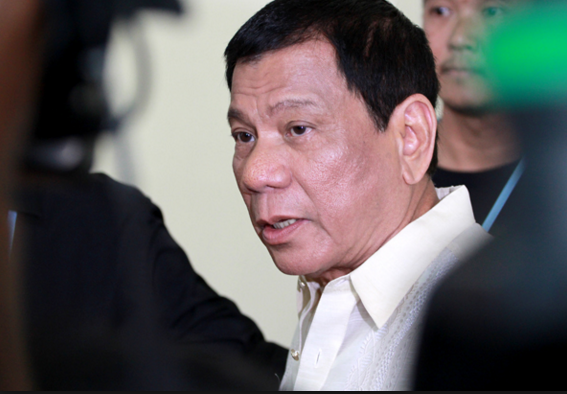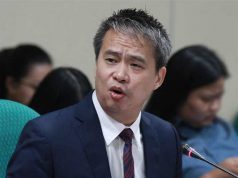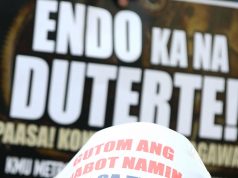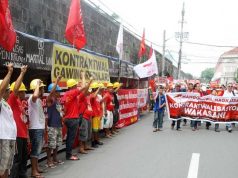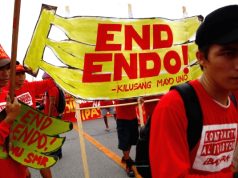(LAST UPDATED – 1:27 p.m./FIRST POSTED – 8:31 a.m.) MANILA, Philippines – Amid workers’ dissatisfaction with the Department of Labor and Employment (DOLE)’s actions on addressing job contractualization, President Rodrigo Duterte on Monday reiterated his 2016 campaign promise to once and for all end the labor practice of hiring workers for short-term, non-regular employment without benefits.
During his Labor Day speech at the People’s Park in Davao City, Duterte answered workers’ clamor for him to issue a stronger executive order that would give teeth to his promise of ending employers’ practice of “endo” or end-of-contract.
“I stand firm in my convictions to end endo. The Labor Code guarantees all workers the rights to security of tenure. This has to be strictly enforced. Panahon lang [We need time]. To this end, I will issue an executive order (EO) directing the strict implementation of existing provisions of laws against endo and labor-only contracting,” the President said.
The DOLE’s issuance last March of Department Order (DO) No. 174, supposedly the administration’s solution to illegal job contracting, fell short of workers’ expectations.
Workers claimed the order did not altogether end the system of contractualization. They said DO No. 174 was just a rehash of DOLE Order No. 18 issued during the Aquino administration that only distinguished “legitimate” from “non-legitimate” contractualization.
“A department order that prohibits labor-only contracting but allows job contracting will send a strong signal to many corporations that they can continue doing their abusive practice because they are protected by DOLE,” said Anne Villasica, spokesperson of All Workers’ Unity.
Duterte asks labor groups to draft EO
While was in Davao during Labor Day, Duterte asked labor groups to draft an EO that would put an end to abusive middlemen contractualization work arrangements and return to the norm of direct hiring by principals and employers, said Michael Mendoza, Chairperson of the NAGKAISA Labor Coalition and President of Associated Labor Unions – Trade Union Congress of the Philippines (ALU-TUCP).
The President gave labor groups within the week to finish the draft order and set the date to meet again on May 10, according to Mendoza.
“The President was sincerely asking for our patience when he asked us to give him time to end contractualization. He was candid enough to allude to vested interest groups lobbying against the end of contractualization,” said Mendoza.
Aside from ALU-TUCP, other labor groups invited by Duterte to participate in the dialogue were the Nagkaisa labor coalition of private and public sector unions, Kilusang Mayo Uno (KMU) and representatives from women, youth and the informal economy workers.
“We told him that workers were not happy with controversial Department Order 174 precisely because it does not carry out his commitment to end contractualization. We emphasized that DO 174 just bans the already previously banned Labor-only contracting and “cabo” system and does nothing to significantly advance the regularization of millions of contractual workers,” said Luis Corral, Vice President of ALU-TUCP.
“The President said he understood what the workers want and suggested that we assert our public interest power to ensure a just transition to help him meet his promise to the nation,” added Corral.
Mendoza said that with the eradication of middlemen, including manpower service cooperatives, “workers see an executive order that would mandate principal employers directly hiring workers, and no longer employing middlemen contractors to avoid paying their social obligations to workers and to avoid the exercise by workers of their Constitutional right to organize unions and bargain for a better deal.”
To hire more labor inspectors
On Monday, Duterte also promised workers that the government “will hire more labor inspectors” who would investigate and report cases of job contracting and subcontracting and other abuses and violations in workplaces.
The government needs to “deputize” additional labor inspectors from trade unions because the DOLE doesn’t have enough manpower to inspect almost 1 million business establishments nationwide, according to Duterte.
“Pila ray trabahante sa (How many are the workers at the) Department of Labor? They cannot be inspecting around 1,000 establishments a day. So mao ni akong (my) proposal, I further order the Department of Labor and Employment to deputize trade unions and to stop conduct inspections of all establishments in the spirit of tri-partism,” the President said.
Duterte urged representatives from labor unions to inspect business establishments and report their abuses to DOLE.
“Mga labor union, you can invade, isumbong sa ilaha. Ang ako lang giingon sa mga representatives, when you make the report, tell me the truth. [Labor unions, you can invade and report to them. What I only tell the representatives is when you make the report, tell me the truth],” the President said.
“Ayaw ko og babaki kasi baka I will adopt your reports then mapahiya ako…[Don’t lie because if I will adopt your reports, I will lose face],” he added.
To ratify ILO Convention 151
Also on Labor Day, Duterte announced that he had decided to ratify the International Labor Organization (ILO) Convention 151.
“I am pleased to announce that I have decided to ratify, gi pirmahan na nako, an ILO Convention 151. I will do the same for the Senate for its concurrence,” said Duterte.
“May this serve as a symbol of government’s commitment to continuously uphold the aspiration of a corrupt-free civil service,” he said.
ILO Convention 151 or the Labor Relations in the Public Services of 1978 calls for the “protection of the right to organize and procedures for determining conditions of employment in the public sector” and will pave the way for public sector unions to gain full bargaining rights.
Currently, rights to collective bargaining, settling disputes, and the conduct of ordinary union activities are enjoyed by private sector unions under the Labor Code but the same are not guaranteed for government workers.
The ratification of ILO Convention 151 is expected to help put an end to graft among government officials and employees as collective bargaining under the convention provides opportunities to design flexible incentives and whistle-blower protection programs and codes of conduct that may dissuade civil servants from corrupt practices.

